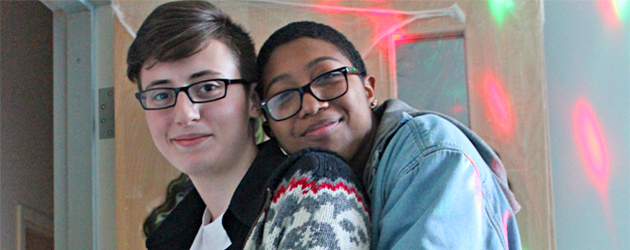LGBTQ youth of color experience disproportionate challenges to their physical and mental health, according to an extensive survey released by The Fenway Institute. The Our Health Matters study is the result of partnership of Fenway, BAGLY Inc., and Boston GLASS aimed at examining and addressing the health needs of LGBTQ youth of color in the Greater Boston area. Our Health Matters was authored by a group of dedicated researchers and experts in their fields: Dr. Kerith Conron, Research Scientist at The Fenway Institute; Johannes Wilson, Study Coordinator; Dr. Sean Cahill, Director of Health Policy Research at The Fenway Institute; Jessica Flaherty, Director of Programs at BAGLY; Mio Tamanaha, Director of Youth Services for JRI Health at Boston GLASS; and Dr. Judith Bradford, Director of the Center for Population Research in LGBT Health and Co-Chair of The Fenway Institute.
The anonymous, cross-sectional survey was conducted between February and August 2014 to address several gaps in local health data, such as data on LGBTQ youth of color, especially transgender youth; data on 19-25 year olds; data on Asian and Pacific Islander (API) youth; and data on youth not enrolled in school. The survey results all pointed to a stark reality: LGBTQ youth of color are struggling to access lifesaving resources. [pullquote]The survey results all pointed to a stark reality: LGBTQ youth of color are struggling to access lifesaving resources.[/pullquote]
“Among LGBTQ youth, the risks that contribute to health disparity conditions disproportionately affect youth of color in Greater Boston,” the report states. “Many are mistreated at home and school. Some have access to supportive programs, while others lack knowledge or awareness of a small number of programs designed to provide needed support.”
The survey findings highlighted some commonalities among Boston’s LGBTQ youth of color:
- Over forty percent of youth reported symptoms of depression and/or anxiety and nearly one in five youth attempted suicide within the prior 12 months.
- Half of the sample reported binge-drinking and half reported marijuana use in the past 30 days. More than one in 10 youth reported any lifetime methamphetamine use.
- Child maltreatment, discrimination, and food insecurity were prevalent and are correlated with poor mental health and substance misuse.
- Racial-ethnic pride, LGBTQ pride, and hope for the future were prevalent and are protective factors.
- About three-quarters of the sample had attended one or more LGBTQ youth programs in the prior 30 days and reported having opportunities to develop leadership skills and/or to make a positive difference in the community. However, just over half reported having paid jobs or internships.
Based on the daily challenges—and incredible resiliency—of LGBTQ youth of color in Greater Boston, the Our Health Matters researchers have drafted a number of recommendations for ways we can better support and affirm the lives of these youth. The recommendations include: [pullquote]“I also hope that people will appreciate the toll that stigma, violence, discrimination and rejection take on the mental health of LGBTQ youth of color and will be motivated to participate in promoting acceptance.”—Dr. Kerith Conron, Research Scientist at The Fenway Institute[/pullquote]
- Addressing the institutional and social root causes of LGBTQ youth of color health disparities — including racism, poverty, LGBTQ stigma, discrimination, victimization, and minority stress
- Inviting these youth to be active partners in developing strategies to improve the health and social conditions of their lives
- Providing paid opportunities for LGBTQ youth of color to engage in program development and delivery, research, and policy analysis and advocacy, in conjunction with support and on-going training to enable sustained success and continued growth
- Ensuring that culturally-competent and affirming mental health and substance use prevention and treatment services are available to all youth who need them
- Supporting collaborative, participatory approaches to research that value science and practice, as well as adult and youth partnerships.
- Monitoring the health of LGBTQ youth of color in high school and beyond by including questions on assigned sex at birth, gender identity, and sexual orientation in all surveillance systems and over-sampling racial-ethnic and sexual and gender minorities.
“I hope that people who view this work will see that LGBTQ youth of color, despite considerable social adversity, are invested in working towards solutions that improve the health and lives of their communities,” said report contributor Dr. Conron. “I also hope that people will appreciate the toll that stigma, violence, discrimination and rejection take on the mental health of LGBTQ youth of color and will be motivated to participate in promoting acceptance.”
Prioritizing the health needs of LGBTQ youth of color is a critical step in fighting the stigma, homelessness, addiction, and social isolation faced by too many young people. As one youth feedback session participant said, “Show people it’s OK to accept and be accepted. Show people ‘I know what you’re going through,’ so people don’t feel so alone.”
Want to receive email updates about what’s happening at Fenway Health? Sign up here.
[From a News Release]








